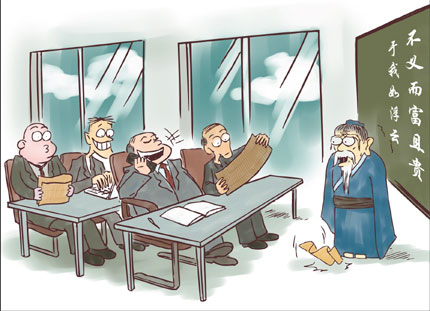Businessmen seek Confucian chic
 0 Comment(s)
0 Comment(s) Print
Print E-mail
Shanghai Daily, December 13, 2011
E-mail
Shanghai Daily, December 13, 2011
Chinese scholars have traditionally been held in high regard and today wealthy businessmen are trying to elevate their status, study the classics and brand themselves Confucian businessmen.
 |
|
Businessmen seek Confucian chic.[Photo/Shanghai Daily] |
Like many Chinese entrepreneurs, 52-year-old Michael Chen puts many impressive titles on his engraved name card - founder, chairman, CEO, executive supervisor and advisory trustee.
But most interesting and unusual are the characters printed under his name, ru shang, literally meaning "Confucian entrepreneur," which sounds like a bit of a contradiction for a businessman dedicated to maximizing profits.
Inside the folded name card is a list of the companies and organizations that Chen is responsible for, including the Southern Confucian Entrepreneurs Association.
Chen is a privileged VIP member of the association, which means he may use the members' luxurious lounges in Hangzhou (Zhejiang Province), Beijing and Shenzhen (Guangdong Province). He receives invitations to small-group events such as tea and jade appreciation and invitations to small, informal get-togethers with famous scholars in various fields of Chinese culture. The association also holds special cross-company events such as receptions of high-level managers in different companies of the same industry.
Since he joined in early 2010, Chen has only attended two events, but he retains the association in third place on his name card, just under the names of two of the earliest companies that he founded.
"Using the term Confucian businessman is a trend and it's good for business," Chen tells Shanghai Daily. "It sets me apart from crass merchants who don't care about regulations or social responsibilities."
Chen asked that his full Chinese name not be published "because this group and associations I'm in are very exclusive and private with many important and famous people as members. And Confucius tells us to keep a low profile and not to care too much about attention in the newspapers or spotlight."
Chen is one of many Chinese businessmen who want to add some Confucian (meaning Chinese culture) cachet to their image and become known as a scholar-businessman.
One young businessman Yang Xianmiao, 28, drew considerable attention and admiration when he was named one of 28 honorees in the 10th National Exhibition of Calligraphy and Seal Carving, China's "Olympics" of calligraphy. He too has expressed wishes of growing into a more mature Confucian businessman.
'New rich'
Chen's story is representative. The native of Zhejiang Province holds a vocational school degree and earned an EMBA just three years ago. In the 1980s, Chen left the local hospital in a small town of Zhejiang, where he worked for five years and "jumped into the ocean" or xia hai, a Chinese expression describing the early entrepreneurs who gave up secure government-assigned jobs to enter the mysterious world of an emerging market and independent business.
Chen's path is typical among the first generation of private Chinese entrepreneurs, often referred to as the "new rich," meaning they haven't received much cultural education compared with businessmen today.
Chen started in pharmaceutical trading, a field he learned about while working in the hospital, and soon extended business into many areas, including food and beverage, exhibitions, consulting and real estate, among others. In the early years of his career, Chen went wherever the money was.
As the company grew larger, he felt the need for a company culture and for personal improvement - first Western management courses and soon popular "China studies," a term covering traditional Chinese philosophy and texts such as the "I Ching" ("Book of Changes"), "Tao Te Ching" ("Classics of the Way and Power/Virtue"), "The Art of War," and "Lun Yu" ("Analects of Confucius"), among many others.






Go to Forum >>0 Comment(s)